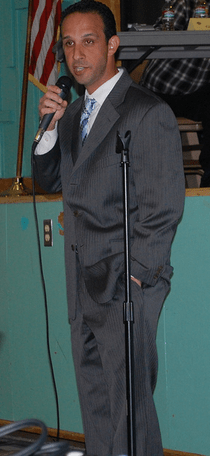Last week, two of Los Angeles' newest Council Members, Mitch Englander and Joe Buscaino, made news by announcing a campaign for a $3 billion bond to fund road repair on L.A.'s worst streets. The "Los Angeles Emergency Local Street Safety and Traffic Improvement Measure" would need a two-thirds vote of city voters in May 21 and would create a twenty year real-estate tax that would be bonded against to fix the 31% of city roads that rate either a "D" or "F" on road conditions in the next ten years.

The proposal, as outlined in the major local news outlets, drew concern from many Livable Streets advocates. The language of the proposal that the City Council would vote to send to the City Attorney, who legally is the one that drafts the ordinance for the ballot, seemed awfully car-centric. To make matters worse, a two-page report by professors at UCLA (pages 2 and 3) accompanying the motion argues that great cities are rated on how easy it is to drive from one place to another.
"Let's not forget that bad roads are a much a threat to cyclists as bad drivers," wrote Ted Rogers, the author of Biking In L.A. and Streetsblog contributor in an email to advocates which well summarized the feelings of a listserve formed to discuss the bond measure. "We all know people who have been taken out by potholes or had to swerve dangerously into traffic to avoid them. But fixing the streets without fixing sidewalks is just more of the same auto-centric (design) that has destroyed the quality of life in this city."
However, in an exclusive interview with Streetsblog, Councilman Englander sounded positively upbeat about the proposed bond's ability to improve street safety for all users.
"Everything that's been approved on city-wide bicycle master plan, everything that's on a reconstructed street would be completed," Englander promised. "That includes the new crosswalks and ADA accesible access to the crosswalks."
This week, the City Council will vote on whether or not to ask the City Attorney to draft an ordinance for the May 21 ballot. Englander's office has already communicated with the City Attorney and city departments on the intent of the bond measure and seems certain that the language that voters see will include not just repairing the 31% of city streets, but also striping them with the most modern approved design including bike infrastructure, Continental Crosswalks, and left and right hand turning lanes.
"The end goal is to improve safety for pedestrians, bicyclists and motorists," he continued.
Englander also argued that just because the bond itself doesn't address the $1.5 billion dollar need to address the crisis of L.A.'s crumbling sidewalks doesn't mean that sidewalk repair is being left behind.
"You can only bond for projects that are specifically listed by law," he explains. "We have conditions for all 28,000 lane miles. We know where all 9,000 lane miles that are in failed and degraded condition are at."
"With sidewalks...they haven't been inventoried yet," he added, referring to Mayor Villaraigosa's plan to inventory the status of all 10,750 miles of city sidewalks over the next several years.
However, the city does officially know where many of the most degraded crosswalks are, and Englander says the final bond measure will allow funds to go to sidewalk repair adjacent to the repaired streets. The $3 billion would cover the entire street repair program for the degraded streets, but as the city earns grants from the state and federal government to work on street repair, the bond would actually produce more cash than is needed to complete the scope of the work.
By statute, that overflow will go to sidewalk repair for projects the city can list, design, and justify.
"Not a dime is allowed to go into the general fund or any other program, other than sidewalk reconstruction or the road repair fund," Englander promises.
The proposal is already under fire from tax increase opponents including the Howard Jarvis Taxpayers Association who argue that road repair should follow a "pay as you go" funding system. However, Englander and Buscaino argue that for whatever reason, the city has allowed it's streets to fall into a disgraceful state of disrepair and now is not the time for finger pointing but action. They hope that the proposal coming from two of the junior Council Members will help blunt criticism that the previous council's should have dealt with this issue earlier.
"We've inherited crumbling infrastructure," Englander closes the conversation. "The question is where do we go from here?"





